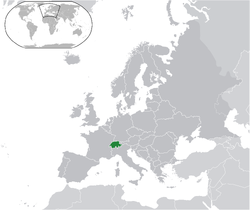|
Schweizerische Eidgenossenschaft | |
| Federation | |

|

|
| Anthem Swiss Psalm | |
| Capital | Bern |
| Government | Republic and parliamentary direct democracy |
| President of the Federal Council | |
| - From 2011 | Micheline Calmy-Rey |
| Legislature | Federal Assembly |
| - Upper house | Council of States |
| - Lower house | National Council |
| History | |
| - September 12, 1848 | Federal state |
| Area | 41,285 km² |
| Population | |
| - 2009 | 7,785,600 |
| Density | 188.5/km² |
| GDP | 2009 (PPP) |
| - Total | US$ 334.8 billion |
| - Per capita | US$ 43,007 |
| Currency | Swiss franc |
| v | |
The Swiss Confederation is a federal and parliamentary direct democracy in Europe.
Background
The Swiss Confederation was founded in 1291 as a defensive alliance among three cantons. In succeeding years, other localities joined the original three. The Swiss Confederation secured its independence from the Holy Roman Empire in 1499. A constitution of 1848, subsequently modified in 1874, replaced the confederation with a centralized federal government. Switzerland's sovereignty and neutrality have long been honored by the major European powers, and the country was not involved in either of the two World Wars. The political and economic integration of Europe over the past half century, as well as Switzerland's role in many UN and international organizations, has strengthened Switzerland's ties with its neighbors. However, the country did not officially become a UN member until 2002. Switzerland remains active in many UN and international organizations but retains a strong commitment to neutrality.[1]
Economy
Switzerland is a peaceful, prosperous, and modern market economy with low unemployment, a highly skilled labor force, and a per capita GDP among the highest in the world. Switzerland's economy benefits from a highly developed service sector, led by financial services, and a manufacturing industry that specializes in high-technology, knowledge-based production. The Swiss have brought their economic practices largely into conformity with the EU's, in order to enhance their international competitiveness, but some trade protectionism remains, particularly for its small agricultural sector. The global financial crisis and resulting economic downturn put Switzerland in a recession in 2009 as global export demand stalled. The Swiss National Bank during this period effectively implemented a zero-interest rate policy in a bid to boost the economy and prevent appreciation of the franc. Switzerland's economy grew 2.8% in 2010, when Bern implemented a third fiscal stimulus program, but its prized banking sector has recently faced significant challenges. The country's largest banks suffered sizable losses in 2008-09, leading its largest bank to accept a government rescue deal in late 2008. Switzerland has also come under increasing pressure from individual neighboring countries, the EU, the US, and international institutions to reform its banking secrecy laws. Consequently, the government agreed to conform to OECD regulations on administrative assistance in tax matters, including tax evasion. The government has renegotiated its double taxation agreements with numerous countries, including the US, to incorporate the OECD standard, and it is working with Germany and the UK to resolve outsanding issues, particularly the possibility of imposing taxes on bank deposits held by foreigners. Parliament passed the first five double-taxation agreements, including that with the US, in March 2010, but the agreements are subject to public referendum. In 2009, Swiss financial regulators ordered the country's largest bank to reveal at Washington's behest the names of US account-holders suspected of using the bank to commit tax fraud. These steps will have a lasting impact on Switzerland's long history of bank secrecy.[2]
President of the Federal Council
- Micheline Calmy-Rey (₩) (January 1, 2011 - )
Nation
Neighbouring Nations
References
- Switzerland: Guide to Law Online (Library of Congress)
- The World Factbook (CIA)
- Chiefs of State and Cabinet Members of Foreign Governments (CIA)
- U.S. Department of State
- Australian Government
- Inter-Parliamentary Union - Council of States
- Inter-Parliamentary Union - National Council
- BBC News Country Profile
- BBC News Time Line
- World Statesmen.org
- International Constitutional Law Project
- Psephos Election Archive
- Wikisource 1911 encyclopedia project
- The Governments of Europe (1913)
- Wikipedia
